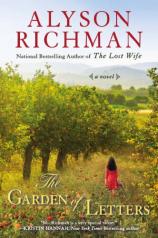Reading Group Guide
Discussion Questions
The Garden of Letters

1. The book moves between several time periods, weaving together Angelo’s and Elodie’s pasts, as well as their present together. How does this enrich the storytelling?
2. A major theme of the novel is how we communicate without words, most notably through the power of music. How else do the characters communicate nonverbally?
3. How do Elodie’s feelings about music change throughout the book? How does this reflect her shifting worldview?
4. Elodie’s father tells her that “you sense what’s hidden beneath the music.” How does this foreshadow her work for the resistance movement? How else is foreshadowing used in the novel?
5. Elodie often says that her extremely precise memory is “the Venetian in me.” Do you think it’s possible to inherit traits from your ethnicity?
6. Lena seems more alive after attending the resistance meetings, and later on, Elodie observes the same in her mother as she aids in the fighting. Why does this happen?
7. Do you think that Elodie, on some unconscious level, purposefully leaves the Wolf’s code out of the cadenza during her concert at the Bibiena? Or is she truly lost in the music? How might the events that follow have changed if she had performed the code?
8. As the Germans enter Verona, average citizens step up to fight: “‘Tell us what to do!’ one of the women shouts. She is not a staffetta, but a matron eager to be useful.” Would you have joined the resistance if you lived in wartime Italy?
9. The account of the Wolf’s ransacked apartment --- “The silk panels were slashed and cut open. The strings of the grand piano had been severed and brutally pulled out like weeds.” --- is disturbing, despite its describing only objects. Why? What do you think ultimately became of the Wolf and his wife? Could they have survived?
10. The first line of the book states, “the rucksack contains her life reduced to small pieces.” Later on, Dalia produces a box filled with small trinkets that she replaces with Angelo’s letters. What would represent your “life reduced to small pieces?” What objects do you consider sacred?
11. Why does Angelo gravitate toward things that need extra care? Considering his history with Dalia and Nasai, has he always done so?
12. Valentina can find beauty and value in items that others see only as trash. What are the parallels between her and Venice itself, a city where “beauty and decay seemed to coexist?”
13. Why does Dalia paper the room with Angelo’s letters? Why does Angelo leave them intact “like an ancient tomb”? And why does Elodie add to them? What does the “garden of letters” represent to each of them?
14. The characters often refer to passages from THE LITTLE PRINCE: “It’s only with the heart that one can see rightly; what is essential is invisible to the eye.” What is the significance of these passages? How does it apply to Elodie’s life in Verona, and later on, in Portofino?
The Garden of Letters
- Publication Date: September 2, 2014
- Genres: Fiction, Historical Fiction, Women's Fiction
- Paperback: 384 pages
- Publisher: Berkley Trade
- ISBN-10: 0425266257
- ISBN-13: 9780425266250








